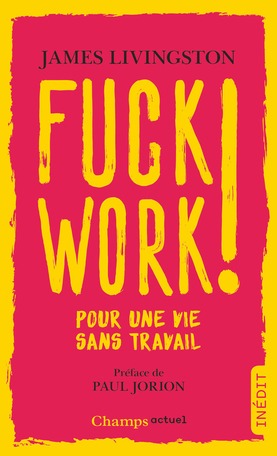Fuck Work Summary
5 min read ⌚
 Economists believe in full employment. Americans think that work builds character. But what if jobs aren’t working anymore?
Economists believe in full employment. Americans think that work builds character. But what if jobs aren’t working anymore?
Our parents raised us to be workers.
We all think that hard work pays off, and that full employment is the answer to all our troubles.
But what if that is not the case? What if jobs are not “the answer” anymore?
Who Should Read “Fuck Work”? And Why?
American politicians disagree about many things, but there is one point they all agree on: the need to restore “full employment.”
However, economic historian James Livingston argues that this is not only unrealistic but uncalled-for as well.
Sharing his views in online magazine Aeon, he presents his theory that the obsession with work disables American people to face everyday situations that do not revolve around their jobs.
We recommend “Fuck Work” for all who do not mind reading a critique of the present day society.
About James Livingston
 James Livingston is an author and history professor at Rutgers University in New Jersey.
James Livingston is an author and history professor at Rutgers University in New Jersey.
“Fuck Work Summary”
Most Americans, and even people from other parts of the world, increasingly define themselves through their jobs.
The reason for this lies in that fact that people’s professions present a daily structure in their lives, create a comfort zone, provide an income, and even a sense of belonging and self-worth.
Jobs are supposedly character builders as well.
However, the belief and obsession with this work ethic are far from the reality of the 21st-century labor market.
What do we mean?
Well, to start with, there is not enough work for everyone, so there are many unemployed people out there.
Studies show that no net jobs have emerged in the US since the 2000s.
But that is not all!
Experts expect that by 2035, half of the existing jobs may disappear due to technological advancements and automation.
The idea that federal policies can recreate full employment in the US is nothing but an unachievable reality.
Furthermore, many of the employees in the US do not earn enough for a comfortable living from their jobs only.
Contrary to what you may think, America is far from the land of the dreams for almost half Americans, who qualify for food stamps. “Transfer payments” from the government make up around 20% of all household income, as well.
So, having all this in mind, the reality that Americans believe in: that hard work will result in high rewards – seems to be untrue.
Livingston argues that there is another reality: many of the people who are employed full time are unable to make ends meet, while others earn millions the easy way: through illegal business practices, like drug dealing, money laundering, deception, and fraud.
Now, we understand that this situation may seem to be bad, but each unwanted position is an opportunity for reflection as well.
What is the point of having a job that does not provide for one’s basic needs? Is there a purpose to it?
If people didn’t have a job, which experiences would mold their character and form their day to day routines?
“What would society and civilization be like if we didn’t have to ‘earn’ a living – if leisure was not our choice but our lot?”
Those are all valid questions that we need to reflect on.
Paid work not only does no longer produce an appropriate income to satisfy people’s basic needs, but it also is not an economic necessity as well.
What are we talking about?
The US government can generate enough revenue to support the sustenance of every single American.
Yes, that is right, the government can raise the Social Security contributions above the current number and increase taxes on corporate income.
Contrary to what you may believe raising corporate taxes will have no adverse effect on job creation since US corporations are not using their profits for creating new jobs.
So, if society can afford welfare payments, what is the problem?
We believe the problem is the people.
If people were told that jobs no longer work, do you think that they would give up what became the foundation of their identity and self-worth?
Key Lessons from “Fuck Work”
1. A Lack of Jobs
2. The Other Side of Reality
3. Questions to Reflect On
A Lack of Jobs
There is not enough work for everyone, so there are many unemployed people out there.
Studies show that no net jobs have emerged in the US since the 2000s.
Moreover, experts expect that by 2035, half of the existing jobs may disappear due to technological advancements and automation.
The Other Side of Reality
Livingston argues that there is another reality: many of the people who are employed full time are unable to make ends meet, while others earn millions the easy way: through illegal business practices, like drug dealing, money laundering, deception, and fraud.
Questions to Reflect On
-
- What is the point of having a job that does not provide for one’s basic needs? Is there a purpose to it?
-
- If people didn’t have a job, which experiences would mold their character and form their day to day routines?
- “What would society and civilization be like if we didn’t have to ‘earn’ a living – if leisure was not our choice but our lot?”
Like this summary? We’d Like to invite you to download our free 12 min app, for more amazing summaries and audiobooks.
“Fuck Work” Quotes
What, exactly, is the point of earning a paycheck that isn’t a living wage, except to prove that you have a work ethic? Click To Tweet Securing ‘full employment’ has become a bipartisan goal at the very moment it has become both impossible and unnecessary. Click To Tweet Taxing the profits of corporations to finance a welfare state that permits us to love our neighbors and to be our brothers’ keeper isn’t an economic problem. It’s something else – it’s an intellectual issue, a moral conundrum. Click To Tweet Already a fourth of the adults actually employed in the US are paid wages lower than would lift them above the official poverty line – and so a fifth of American children live in poverty. Click To Tweet So this Great Recession of ours – don’t kid yourself, it ain’t over – is a moral crisis as well as an economic catastrophe. You might even say it’s a spiritual impasse, because it makes us ask what social scaffolding other than work will… Click To TweetOur Critical Review
James Livingston writes a critique of the American work culture which, according to him prevents them from finding a non-work-related purpose in life.
His ideas are compelling, and he engagingly presents them.
Emir is the Head of Marketing at 12min. In his spare time, he loves to meditate and play soccer.


 Economists believe in full employment. Americans think that work builds character. But what if jobs aren’t working anymore?
Economists believe in full employment. Americans think that work builds character. But what if jobs aren’t working anymore? 




